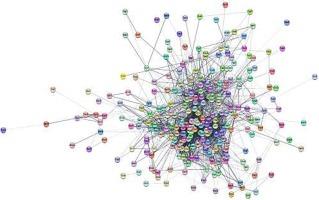Identification of key pathways and genes responsible for aggressive behavior |
| |
| Affiliation: | 1. Department of Computer Science, IBA, Karachi, Pakistan;2. Bioinformatics and Molecular Medicine Research Group, Dow Research Institute of Biotechnology and Biomedical Sciences, Dow College of Biotechnology, Dow University of Health Sciences, Karachi, Pakistan;3. Department of Computer Science, IBA, Karachi, Pakistan;4. Department of Computer Science, IBA, Karachi, Pakistan;1. Department of Urology, Changzheng Hospital, Naval Military Medical University, Shanghai, 200003, China;2. Department of Orthopedics, Changhai Hospital, Naval Military Medical University, Shanghai, 200433, China;1. Center for Global Tobacco Control, Department of Social and Behavioral Sciences, Harvard School of Public Health, Boston, USA;2. Department of Social Medicine, University of Crete, Greece;3. CIBER Fisiopatología de la Obesidad y Nutrición (CIBERobn), Instituto de Salud Carlos III (ISCIII), Spain;4. Unit for Nutrition Epidemiology, Department of Preventive Medicine, University of Málaga, Málaga, Spain;5. Immunonutrition Research Group, Instituto de Ciencia y Tecnología de los alimentos y Nutrición, Consejo Superior de Investigaciones Científicas (CSIC), Madrid, Spain;6. Centre of Toxicology Science and Research, University of Crete, Greece;1. Division of Radiation Oncology, Cross Cancer Institute, Edmonton, Alberta, Canada;2. Department of Oncology, University of Alberta, Edmonton, Alberta, Canada;3. Division of Experimental Oncology, Cross Cancer Institute, Edmonton, Alberta, Canada;4. Division of Medical Physics, Cross Cancer Institute, Edmonton, Alberta, Canada;1. Department of Allergy, The Third Affiliated Hospital of Shenzhen University, Shenzhen, 518020, China;2. Musculoskeletal Research Laboratory, Department of Orthopaedics & Traumatology, Faculty of Medicine, The Chinese University of Hong Kong, Shatin, 999077, Hong Kong Special Administrative Region;3. College of Life Sciences, Northwest University, Shaanxi, 712100, China;1. Department of Cell Biology and Genetics, Chongqing Medical University, Chongqing 400016, China;2. Molecular Medicine and Cancer Research Center, Chongqing Medical University, Chongqing 400016, China;3. Experimental Teaching Center, Chongqing Medical University, Chongqing 400016, China;4. Department of Bioinformatics, Chongqing Medical University, Chongqing 400016, China |
| |
| Abstract: | 
Aggression is a complex behavior, underpinned by cross talk between several biomolecules. To date a composite molecular network of the behavioral disorder has not been constructed. The present study aims to develop the same from the system network analyses recruiting genes with empirical evidence demonstrating their role in the incidence and progression of aggression. In short, 327 genes were recruited in the study after extensive literature survey and subsequent shortlisting by sieving out the comorbidities like cancer and other pathological and physiological ailments, other languages and repeated citations. Subsequent String network analysis coalesces 275 genes in a network with 2223 edges. The developed network was then subjected to delineate modules using MCODE which via gene clustering on the basis of gene ontology segregate all genes into 14 modules. Of these, as expected top 5 modules involved entailing of neuronal signaling pathways with redundant repetitions. Finally, 10 genes (known) were picked randomly, accounting average module size, and subjected to the network analysis with 100,000 bootstrap replicates. This results in the detection of certain novel genes that lacks empirical evidence for their association with the aggression. Amongst those, most notable are genes involved in protein turnover regulation like UBC, UBA, mitogenic proteins such as Rho and Myc, transcription factors like Tp53. The findings in turn fill caveats in the molecular resolution of cross talk that underscore the development of aggressive behavior and may then be exploited as screening biomarker and/or therapeutic intervention for aggression. |
| |
| Keywords: | Aggression Systems network STRING Behaviour Ubiquitination |
| 本文献已被 ScienceDirect 等数据库收录! |
|

